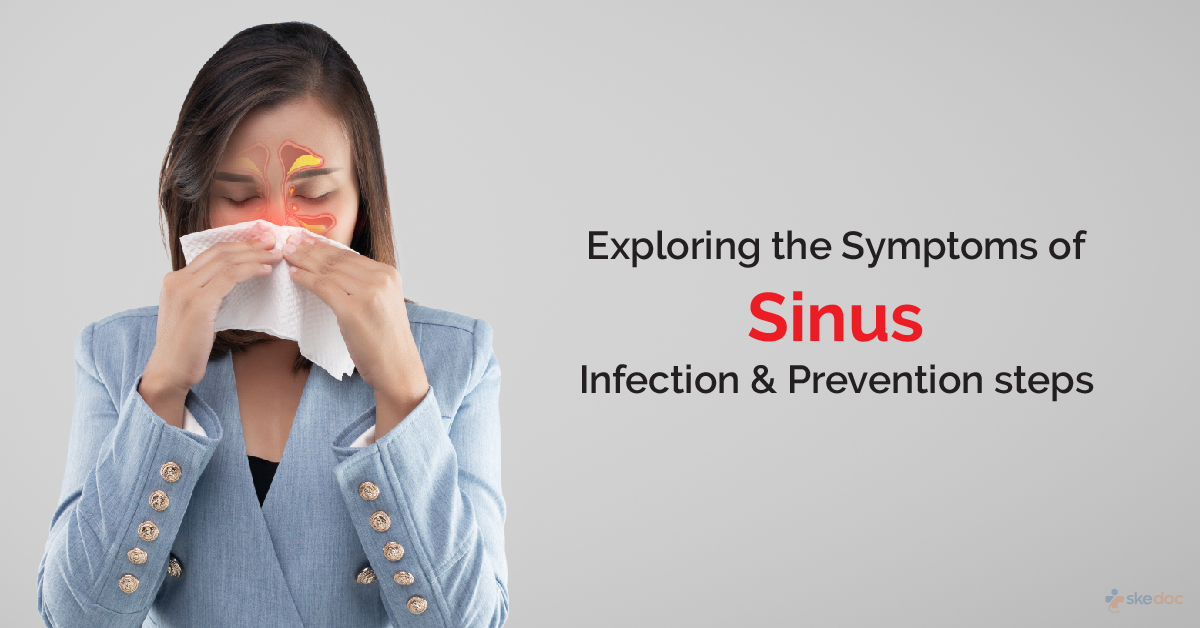Allergy
Blood Diseases
Bone & Joints
Brain
Cancer
Child Care
Cosmetic Surgery
Diabetes
Endocrinology
ENT
Eye
Gen Medicine
General Surgery
Heart
Kidney
Lifestyle
Liver & Digestive
Lung
Men’s Health
Mental health
Physiotherapy
Rheumatology
Skin and hair
Sleep Disorders
Spine
Transplant
Women Health
Thyroid
Vascular Surgery
Sinus Infection

Sinuses are empty cavities in the skull around the nose. Their function is mainly to keep the weight of the skull light. Based on their location, they have different names. Frontal sinus in the forehead region, ethmoid sinus between the eyes, maxillary sinus in the cheek area, and sphenoid sinus at the back end of the nose. These sinuses inside are lined by the same pink skin you see in the nose, and all these sinuses ultimately open into the nose, draining their mucus into the nose.
An infection of any of these sinuses is called as SINUSITIS. Sinusitis can be due to many reasons. Most commonly, it is due to a bacterial infection. Fungal infection is also very common nowadays. Sinus infection starts as a part of a common cold, but due to the swelling of the mucosa of the nose, the sinus openings get blocked, and infection starts in the sinuses, which cannot drain their secretions. Symptoms of sinusitis usually include nose block, fever, thick/sticky nasal discharge, post-nasal drip and headache. CT-SCAN of the nose and sinus is done and usually gives us an accurate diagnosis.
Treatment
Treatment usually includes antibiotics, pain and fever management, anti-allergic medication, and sometimes a short course of low dose steroids to reduce the inflammation and swelling in the nose.
Symptoms Of Spreading Sinus Infection
As sinuses are in close relationship with important structures like the upper jaw and teeth, eyes and brain, and the bones separating these structures are thin, a delayed diagnosis or non-recovery with routine treatment may spread the infection to the nearby structures. If any presenting symptoms last more than 2 weeks without any improvement or if any of the symptoms worsen, it indicates a spreading sinus infection. A few other symptoms include:
- High fever not reduced with medications.
- Headache not reducing with routine treatment.
- Severe pain between the eyes / behind the eyes / over the cheek or upper jaw
- Blurring of vision
- Greenish, foul-smelling discharge from the nose
- Feeling dizzy/disoriented throughout the day.
Steps To Keep Sinuses Healthy
Keeping our nose and sinuses healthy is quite simple. Small everyday practices can help significantly.
- Stay hydrated: Sinus mucosa is kept moist by mucus, which is 70% water and staying hydrated helps have healthy mucus production from the cells and good function of the cells.
- Steam inhalation: YES! This age-old practice is a boon to all. Do it once daily after you are home from work to keep irritants out of your nose. It also helps to smooth the mucosa and reduce any swelling that might have happened due to the irritants.
- Practice Nasal rinsing: Surprisingly, this is also an ancient technique called JAL-NETI, used by many gurus and olden day medical practitioners. Cleaning the nose daily with SALINE water helps to clear the nose of any dry crusts / irritant particles. It also helps to keep the nose moist. Nowadays, ready made SALINE NASAL SPRAYS are available at all pharmacies.
- Avoid anti-allergic medications: Aviod until prescribed by your doctor, as these medications usually dry the nasal mucosa to reduce excessive mucus production.
- Avoid excess dust exposure: If you have a humidifier/air filter at home, do regular cleaning and maintenance.
- Sun exposure: Get a good amount of sun exposure every day, which helps in our VITAMIN D stores. Vitamin D deficiency has been linked to many diseases of the nose and lungs.
- Avoid common allergens and stop smoking: Smoke in all forms is extremely harmful to your nose and lungs.
Finally, maintaining a good diet rich in antioxidants and getting adequate sleep helps our overall well-being, hence less risk of catching common viral infections.
You need to consult an ENT specialist as soon as possible in these cases to diagnose the problem and start the correct treatment accurately. Avoid going to the general practitioner.
Was this article helpful?
YesNo




